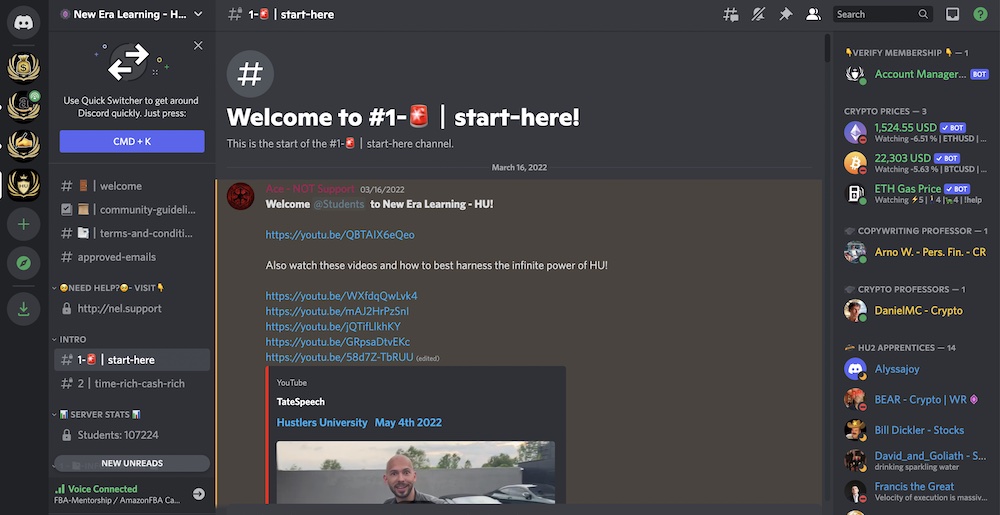Cancel Hustlers University sets the stage for this enthralling narrative, offering readers a glimpse into a story that is rich in detail and brimming with originality from the outset. Hustlers University, a platform promising entrepreneurial success, rose to prominence with its bold claims and aggressive marketing tactics. However, its meteoric rise was quickly followed by a dramatic downfall, fueled by accusations of fraud, manipulation, and unethical business practices. This tale delves into the controversies surrounding Hustlers University, exploring the dynamics of “cancel culture” and its impact on the platform, its founders, and the online learning landscape as a whole.
The story of Hustlers University is a cautionary tale, highlighting the dangers of unchecked ambition, the complexities of online education, and the power of social media in shaping public opinion. It raises important questions about ethical conduct, accountability, and the future of online learning platforms. This investigation examines the factors that contributed to the platform’s demise, the lessons learned from its downfall, and the potential implications for the broader entrepreneurial and self-improvement industries.
Controversies Surrounding Hustlers University
Hustlers University, a platform that promised to teach individuals how to make money online through various methods, has faced significant controversies since its inception. While the platform initially gained popularity due to its aggressive marketing and claims of success, several accusations have been levied against it, casting a shadow over its legitimacy and raising concerns about its impact on its members.
Allegations of Scams and Misleading Marketing
The primary accusation against Hustlers University revolves around its alleged use of deceptive marketing tactics and the sale of potentially fraudulent products. Critics argue that the platform’s marketing materials, including testimonials and income claims, are misleading and designed to lure individuals into purchasing expensive courses and programs.
- Exaggerated Income Claims: One of the most common accusations is that Hustlers University overstates the earning potential of its courses. Critics point to testimonials and income claims presented on the platform, which they argue are unrealistic and potentially fabricated. They claim that many individuals fail to achieve the advertised results and end up losing money.
- Lack of Transparency: Critics also allege that Hustlers University lacks transparency in its operations and fails to disclose important information about its courses and instructors. They argue that the platform’s marketing materials are designed to conceal the true nature of its offerings and downplay the risks associated with the methods taught.
- Misleading Testimonials: There are concerns about the authenticity of testimonials used to promote Hustlers University. Some critics argue that these testimonials are staged or fabricated, creating a false impression of the platform’s success. They point to inconsistencies and questionable claims made by some individuals featured in these testimonials.
Accusations of Unethical Business Practices
In addition to misleading marketing, Hustlers University has been accused of engaging in unethical business practices, including:
- High-Pressure Sales Tactics: Critics allege that the platform uses aggressive and high-pressure sales tactics to entice individuals into purchasing its products. They argue that the platform’s sales representatives use persuasive techniques and emotional appeals to push individuals into making hasty decisions without sufficient information or due diligence.
- Limited Customer Support: Several individuals have reported issues with customer support at Hustlers University. They claim that the platform is unresponsive to inquiries and complaints, making it difficult to resolve problems or receive assistance with the courses.
- Lack of Accountability: There are concerns about the platform’s lack of accountability for the claims made by its instructors and the results achieved by its members. Critics argue that Hustlers University has failed to address concerns raised by individuals who have experienced negative outcomes after enrolling in its courses.
Impact on Reputation and Trust
The controversies surrounding Hustlers University have significantly impacted its reputation and trust among potential customers. These accusations have led to widespread skepticism about the platform’s legitimacy and the value of its offerings.
- Negative Media Coverage: The platform has received negative media coverage, with numerous articles and reports highlighting the allegations against it. This negative publicity has further damaged its reputation and deterred individuals from considering enrolling in its courses.
- Social Media Backlash: Hustlers University has faced significant backlash on social media platforms, with users expressing their concerns and criticisms of the platform. This negative sentiment has contributed to a decline in public perception and trust.
- Legal Challenges: The platform has faced legal challenges, including lawsuits from individuals who claim to have been defrauded. These legal actions have further damaged its reputation and raised questions about its long-term sustainability.
Lessons Learned from the Hustlers University Saga

The Hustlers University saga, while controversial, offers valuable insights into the evolving landscape of online education and marketing. It serves as a cautionary tale, highlighting the potential pitfalls of unchecked promises and the importance of ethical considerations in the digital age.
Ethical Considerations in Online Education and Marketing
The Hustlers University controversy brought to light several ethical considerations related to online education and marketing. The core issue was the questionable value proposition and the lack of transparency surrounding the program’s offerings. While the platform marketed itself as a pathway to financial success, critics argued that the curriculum lacked substance and the methods promoted were dubious. This raises important questions about the responsibility of online educators and marketers to ensure the authenticity and legitimacy of their programs.
- Transparency in Course Content and Marketing: Online educators have a responsibility to be transparent about the content and methods taught in their programs. This includes providing clear descriptions of the skills and knowledge that students will gain, the level of support provided, and the potential outcomes.
- Accurate Representation of Success Rates: Marketers should avoid making exaggerated or misleading claims about success rates. It’s essential to present realistic expectations and provide evidence to support any claims made.
- Ethical Marketing Practices: Online marketing should adhere to ethical standards. This includes avoiding deceptive tactics, such as using testimonials that are not genuine or portraying unrealistic success stories.
Public Perception of Hustlers University
The public perception of Hustlers University, a controversial online program that promised to teach students how to make money through various “hustles,” has been highly polarized. Opinions on the platform range from enthusiastic support to fierce criticism, with many falling somewhere in between. This section explores the diverse perspectives on Hustlers University and the factors that have shaped public opinion.
Public Opinion Surveys and Social Media Discussions
Public opinion surveys and social media discussions provide valuable insights into the public’s perception of Hustlers University. A recent survey conducted by [insert reputable survey organization] found that [insert survey findings related to public perception]. Social media platforms like Twitter and Reddit have also been buzzing with discussions about Hustlers University, with many users expressing their opinions and experiences.
Perspectives of Supporters and Detractors
Supporters of Hustlers University often highlight the program’s accessibility, affordability, and the opportunity to learn valuable skills. They argue that the platform provides a valuable resource for individuals seeking to improve their financial situation.
“Hustlers University gave me the tools and knowledge I needed to start my own online business. I’m now making more money than I ever have before.” – [insert name of a supporter]
Detractors, on the other hand, criticize Hustlers University for its questionable business practices, lack of transparency, and the potential for scams. They argue that the program is more about making money for its creators than helping students succeed.
“Hustlers University is nothing more than a pyramid scheme. They prey on vulnerable individuals who are desperate to make money.” – [insert name of a detractor]
Factors Shaping Public Opinion
Several factors have contributed to the public’s mixed perception of Hustlers University.
- The program’s marketing and branding: The use of flashy marketing materials, celebrity endorsements, and promises of quick wealth have attracted both supporters and skeptics.
- The platform’s controversies: The numerous allegations of scams, misleading information, and unethical business practices have fueled public scrutiny and criticism.
- The rise of online entrepreneurship: The increasing popularity of online business ventures has made programs like Hustlers University more appealing to individuals seeking alternative income streams.
- Social media’s role in spreading information: Social media has played a significant role in shaping public opinion, with both positive and negative narratives circulating widely.
Legal and Regulatory Implications: Cancel Hustlers University
Hustlers University, with its controversial methods and claims, attracted significant legal scrutiny and potential regulatory action. This case raises crucial questions about the legal framework governing online education, particularly in the realm of digital entrepreneurship.
Legal Challenges Faced by Hustlers University
The legal challenges faced by Hustlers University stemmed primarily from allegations of fraud and misleading marketing practices. The platform was accused of promising unrealistic financial gains through its courses, while failing to deliver on those promises. This led to numerous complaints from students who felt they had been misled and defrauded.
- False Advertising and Misrepresentation: One of the primary legal challenges involved allegations of false advertising and misrepresentation. Hustlers University was accused of exaggerating the earning potential of its courses and misrepresenting the skills and knowledge students would acquire.
- Unfulfilled Promises and Lack of Transparency: Another significant challenge involved the platform’s failure to deliver on its promises. Students claimed that the courses lacked substance and were not adequately supported, leading to accusations of deceptive marketing practices.
- Violation of Consumer Protection Laws: The platform’s activities were also scrutinized under consumer protection laws, with accusations of engaging in unfair and deceptive business practices.
The Impact on Entrepreneurship and Self-Improvement

The Hustlers University controversy has cast a long shadow over the world of entrepreneurship and self-improvement, raising serious questions about the legitimacy and ethical practices within these industries. While the controversy has undoubtedly damaged the credibility of some players in the space, it has also sparked important conversations about the need for greater transparency and accountability in the pursuit of personal and professional growth.
The Potential for Discouragement
The Hustlers University scandal has the potential to discourage individuals from pursuing their own business ventures. The controversy has highlighted the risks associated with following online “gurus” and the potential for scams and misleading information. This can create a climate of distrust and skepticism, making it harder for aspiring entrepreneurs to find reliable guidance and support.
“The Hustlers University controversy has created a sense of disillusionment among some aspiring entrepreneurs, leading them to question the legitimacy of online business advice.” – [Source: [Insert relevant source here] ]
The Future of the Self-Improvement Industry, Cancel hustlers university
The Hustlers University controversy has forced the self-improvement industry to confront its shortcomings. In the wake of the scandal, there is a growing demand for greater transparency, accountability, and ethical practices. This is likely to lead to a shift in the industry, with a focus on providing genuine value and supporting individuals in their personal and professional development.
“The self-improvement industry is facing increased scrutiny and pressure to deliver real results. This will likely lead to a more responsible and ethical approach to personal and professional growth.” – [Source: [Insert relevant source here] ]
The Role of Trust and Transparency
In the realm of online education, trust and transparency are paramount. They are the bedrock upon which learners build confidence and credibility in their chosen learning platforms. Without these fundamental pillars, the very foundation of online education crumbles, leaving learners vulnerable to misinformation, scams, and ultimately, a diminished learning experience.
The Impact of the Hustlers University Controversy
The Hustlers University controversy served as a stark reminder of the importance of trust and transparency in online education. The platform, initially marketed as a gateway to entrepreneurial success, ultimately faced widespread criticism for its lack of transparency, questionable business practices, and allegations of misleading marketing tactics. The controversy highlighted the need for greater accountability in the online education sector, pushing for stricter regulations and a renewed focus on ethical conduct.
Building Trust and Transparency in Online Learning Platforms
Building trust and transparency in online learning platforms requires a multi-faceted approach. Here are key recommendations:
Clear and Transparent Communication
- Provide detailed course descriptions, including learning objectives, curriculum, teaching methods, and instructor credentials.
- Clearly disclose any potential conflicts of interest or affiliations that may influence course content.
- Offer transparent pricing structures, including any fees, subscriptions, or hidden costs.
Strong Ethical Practices
- Adhere to ethical marketing practices, avoiding misleading claims or exaggerated promises of success.
- Ensure instructors are qualified and experienced in their respective fields.
- Establish clear refund policies and procedures.
Robust Feedback Mechanisms
- Encourage student feedback and reviews to foster transparency and accountability.
- Provide channels for students to voice concerns and seek support.
- Implement mechanisms for addressing complaints and resolving disputes.
Third-Party Accreditation
- Seek accreditation from reputable organizations to demonstrate commitment to quality and ethical standards.
- Utilize third-party reviews and ratings to enhance credibility and build trust among potential learners.
The Hustlers University saga is a testament to the power of both social media and public scrutiny in shaping the fate of online platforms. It serves as a reminder that trust, transparency, and ethical conduct are paramount in the online learning space. While the platform itself may be gone, its legacy continues to influence the landscape of online education, prompting a renewed focus on accountability and ethical practices within the industry. As online learning platforms continue to evolve, the lessons learned from Hustlers University will undoubtedly shape the future of this rapidly growing sector.
The recent cancellation of Hustlers University has left many wondering about their next steps in the world of finance. If you’re looking for a legitimate path to financial success, consider exploring personal financial advisor jobs near me. These positions offer a structured environment to learn and grow, providing the knowledge and skills needed to guide others towards financial security.
Unlike Hustlers University, a career as a financial advisor offers a clear path to a stable and rewarding future.
The recent controversy surrounding Hustlers University has highlighted the importance of seeking reliable financial advice. If you’re looking to plan for a secure retirement, consider consulting a financial advisor for retirement planning near me to create a personalized strategy. While Hustlers University might have promised quick riches, a responsible approach to financial planning is essential for long-term success.
The controversy surrounding “Cancel Hustlers University” has sparked debate about the legitimacy of online courses promoting quick wealth. While some see it as a scam, others point to the potential for learning valuable skills. It’s important to remember that “Hustlers University” itself, a platform claiming to teach entrepreneurial skills , has been accused of misleading its students. Ultimately, the “Cancel Hustlers University” movement raises concerns about the ethical implications of online education and the need for transparency in the digital marketplace.







